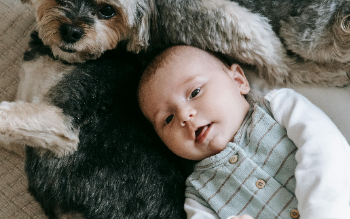Baby Safety 101: Essential Tips for Parents

September is Baby Safety Month! We’re here to share important safety tips every parent should know. Research shows that the more aware we are of dangers and the more steps we take to reduce risk, the less likely our children are to get hurt. Still, accidents can happen to anyone, so staying cautious is always important.
1/ Safe Sleep
You may know: Babies should sleep alone, on their back, in a crib or bassinet without bumper pads, blankets, pillows, or stuffed animals.
You may not know: Feeding tools are not sleeping tools. Boppys or other nursing pillows can block a baby’s airway and are not safe for sleep.
2/ Car Seat Safety
You may know: How to pick the right car seat, register it for recall alerts, and get it installed correctly. (If not, this is a great resource.) You may even know where to have it inspected (scroll to the bottom of this page for locations near you!)
You may not know: Loose items, like toys or mirrors attached to the car seat, can be dangerous in a crash. Only use items that come with the seat or are approved by the manufacturer.
3/ Small Objects
You may know: Choking hazards are a real danger, so keep coins, batteries, magnets, and other small items out of reach.
You may not know: Items sold as decorations do not have to meet toy safety standards and should not be given to babies. Also avoid plastic items that can break into sharp pieces. As a quick test, try fitting a toy into an empty toilet paper tube. If it fits inside, it’s too small and could be a choking hazard.
4/ Preventing Falls
You may know: Babies love to explore, which makes falls one of the most common injuries in children.
You may not know: You can prevent many falls by:
Anchoring heavy furniture and TVs to the wall
Installing safety gates at the top and bottom of stairs
Using window guards or safety glass and moving furniture away from windows
Avoiding wheeled walkers, which can tip over or cause falls
Keeping one hand on baby at all times during diaper changes
Securing children in high chairs and on changing tables
Keeping baby carriers on the floor, not raised surfaces
5/ Medicine and Cleaning Supplies
You may know: These items should be kept out of reach, and using locked cabinets or safety latches adds protection.
You may not know: Safe storage should start the day your baby comes home. The American Academy of Pediatrics recommends keeping all medicine in its original container, locking it away, writing down how many pills are in it each day in case of a spill, saving the Poison Control number (1-800-222-1222) in your phone and more.
6/ Bath Time Safety
You may know: Babies can drown in just a few inches of water, so they should never be left alone in the bath.
You may not know: Babies can tip over in bath seats or rings, so have supplies close by and keep your eyes on them at all times. In addition, keep bathroom doors and toilets locked to prevent drowning instances.
7/ Drowning
You may know: It’s important to watch little ones closely around bath time, pools, and any water.
You may not know: Drowning is the leading cause of death for children ages 1–4, the second leading cause of unintentional injury for children ages 5–14, and the leading cause of death for children and adults with autism. For children under 5, 87% of drowning deaths happen in home pools or hot tubs. If your child goes missing, check the water first. According to the Red Cross, 69% of young children found drowned in pools were not expected to be near the water at all.
8/ Pets
You may know: It’s vital to be careful when your baby is around pets. Always watch closely, and only let them interact if you trust the pet’s behavior. Wash your child’s hands after contact.
You may not know: Experts recommend children under 5 avoid reptiles, amphibians, baby chicks, ducklings, and even petting zoo animals because they carry a higher risk of illness.
9/ Burns
You may know: Hot liquids, stoves, ovens, and fireplaces can cause serious burns, so it’s important to keep babies and toddlers away from them.
You may not know: A baby’s skin burns much faster than an adult’s. There are many simple ways to lower the risk of burns—such as setting your water heater to 120°F (49°C) or lower, storing matches and lighters safely, and keeping screens on fireplaces and furnaces. For more tips, check out this guide from Nationwide Children’s Hospital.
Sources:
American Academy of Pediatrics
Cribs for Kids / Cuyahoga County Board of Health
Nationwide Children’s Hospital
Parents as Teachers
Red Cross: Water Safety for Kids
The National Highway Safety Administration
About the Author:
Heather Sakai has been a member of the Bright Beginnings team since early 2022, serving as the Social Media Engagement Coordinator. She holds a Master of Science in Social Service Administration and a Master of Arts in Contemporary Dance from Case Western Reserve University. Heather brings experience in social work and mood disorders research, marketing and social media, as well as dance instruction for children and adults in both the United States and abroad. Passionate about connecting people through social media, Heather strives to make it a safe space to ask questions, be vulnerable, and share successes and struggles. She is also the administrator of Cuyahoga Parents Connect and warmly invites you to join if you are a parent or caregiver of a child from birth to kindergarten, or if you are expecting a child.
Posted: Monday, September 1, 2025